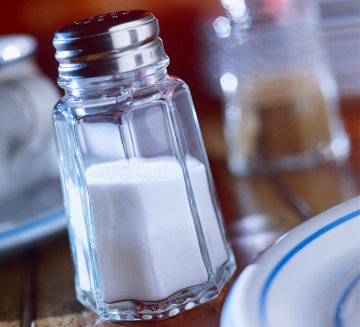The plaid couch and orange shag carpet in your grandmother's 70s living room may seem outdated and old-timey to you. Her time capsule, however, might not just be keeping her young, it could be keeping her alive.
In an experiment
documented by the BBC, researchers found that pretending you are living in your youth may actually impact how young you feel and act. The BBC invited six aging British celebrities to live in a country house for a week. From the clothes they wore to TV shows they watched, the participants, aged 76 to 88, were submerged in a time when they were in their heyday. Their bedrooms were even replicas of the ones they slept in during that decade.
The three actors, one athlete, and two journalists—all retired— volunteered to take care of themselves in the house and engage in assigned tasks, like carrying their bags up a flight of stairs. A team with surveillance cameras quietly observed them through it all.
Fending for themselves, the BBC notes, was a big challenge for the six, but also encouraged pushing past age-related limitations. They watched one participant who normally relied on two canes or a wheelchair to get around, triumphantly take nearly 150 steps using only one cane.
Although the BBC admits the participants' progress was not uniform, the changes in confidence, independence, and physical ability are notable. After just one week of living like it was the 70s, testing revealed almost all of them had improved memory, stamina, eyesight, and mood.
These results are fascinating, but not out of the blue. The BBC experiment was inspired by 1979 research conducted by Harvard professor Ellen Langer, who took a group of men back to the year 1959 in her own legendary "counterclockwise study."
"It's too easy to have everybody take care of us. But you can be helped to death," Langer noted.
In fact, the BBC points to a study that shows when nursing home residents were given some small responsibility and choice in how they spent their time, only 18 months later they were more active, alert, happy and "far more likely to be alive."
However, you might not have to go back twenty (or more) years to regain the confidence and mobility you had as a younger person. But, according to Langer's research, you may have to go against the grain if you want to be an elderly person who continues to act, feel, and live young.
And, experts say, you have to get started right away. Developing good brain habits now,
reports Dr. Cynthia R. Greene, author of
Total Memory Workout: 8 Easy Steps to Maximum Memory Fitness, will improve your current daily intellectual performance as well as reduce the risk for dementia in years to come.
Before you dig out your polyester culottes from decades past, try the following—experts believe they can help us all hold on to the best parts of our youth as the years go by.1. Break out the community college catalog or sign up for sign language class. Remember when people wrote in your high school yearbook, "Don't ever change"? Forget that. Although it was once believed that our brains were hardwired for specific tasks, new information shows that our brains are dynamic and even rejuvenating. This means a stroke victim may be able to transfer skills from a damaged region of the brain to one that is more viable, says
Dr. Terry Grossman, author of
Transcend: Nine Steps to Living Well Forever. It also means that acquiring new skills as we age will help keep us youthful.
"Utilizing previously unused areas of the brain as one ages can help slow down, stop, and reverse some signs of brain aging," Dr. Grossman says.
How can you jump on that tomorrow? Dr. Grossman says learning a new language, taking music lessons to play a new instrument, sitting in on an adult education class in a subject you've always been curious about, or traveling to an area you've never explored are all ways to get neurons firing.
2. Work your body. Data strongly suggests that regular aerobic activity improves human brain power immediately and could protect us from major memory impairment in the long term. Even walking for 45 minutes a few times a week can make a difference.
"Even folks with limited mobility or cognitive impairment should be encouraged to maintain their aerobic wellness as much as possible by participating in activities that are accessible to them [such as "sit and be fit" programs, water aerobics, etc.]," Dr. Greene notes. "A small study a few years ago out of Australia suggested that regular aerobic activity may slow progression of memory impairment in individuals in the early stages of the disease. While that needs to be replicated and seen in larger samples, it was an interesting window into the role exercise may play for brain health across the board."
3. Feed your body, but only until it is 80 percent full. Whether you want to recapture or hang on to your youthfulness, you're going to have to pay more attention to the food and drink you put into your body.
Longevity expert and author Dan Buettner partnered with National Geographic
to study how people in some pockets of the world not only live longer, but live better. He compressed their lessons into nine tenets, and it's not a shocker that one of them is to eat wisely.
"Instead of groping from fad diet to fad diets, use strategies for eating 20 percent less at meals. Avoid meat and processed food," Buettner says. More obviously, he adds that it's a good idea to consume more vegetables and, if it works for your health history and current medical condition, drink red wine in moderation.
4. De-stress, and soon. We hear about releasing stress so often that it can easily feel like one more overwhelming task on the to-do list. But Dr. Grossman says it is a must if you want to live longer and feel good during all of those years.
The stress situation in this country is dangerously excessive and could be causing us to age more quickly, he notes.
"It is estimated that with the current economic conditions, stress levels in the United States today are approaching those that existed in the days following 9/11," Dr. Grossman asserts.
To break the cycle of stress, try engaging in a hobby, taking scheduled vacations, or regularly get spa treatments or massages.
5. Keep playing the classic games, just do them faster. Our intellectual skills change as we age. The great news, Dr. Greene says, is that deductive reasoning and our base of knowledge improve. The challenge, however, is that our attention, processing speed, short-term memory, and cognitive flexibility often slow. Just like our biceps, regularly exercising mental muscles can help us stay healthier over time.
While you can certainly use online games for brain fitness, Dr. Greene also suggests pulling out games that challenge memory, oldies-but-goodies like Boggle, Simon, Bananagrams, or even the word jumble. To glean the greatest benefit, time yourself with the goal of getting faster each time.
6. Be social, but choose your friends wisely. "It has been found," Dr. Grossman reports plainly, "that being socially isolated has health risks on par with those of cigarette smoking."
While the most important thing you can do to keep yourself young during your lifetime is to be social, Dr. Buettner says it is also critical that you spend time with people who have the healthy habits you prioritize or want to emulate.
He calls this choosing "the right tribe" and says centenarians, people who live to at least 100f, show exactly how this works.
"All of the world's longest-lived people were born into -- or consciously chose to associate with -- the right people . If your three best friends are obese, there's a 50 percent better chance that you'll be obese," says Dr. Bruettner. "The reverse is true, too. If you dine with people who eat healthy food, you're more likely to eat healthy food, if the friends you spend most time with play a sport, you're more likely to join them."He says our trend toward isolation -- 15 years ago, the average American had three good friends, as compared to two today -- is shaving years off of our lives. Finding a community of just a few people who stimulate you intellectually, encourage you to try new things and be physically active, and maybe even play a round or two of Yahtzee! could hit lots of targets as you aim to stay young from year to year.
What do you do if some of those important people, like caretakers or friends or even grown children, in your life won't stop telling you to slow down, reduce your activity, and accept your age? Dr. Grossman responds bluntly, "Wrong advice -- no matter how well-intentioned -- is still wrong. I would ignore it."
7. Take control of your life by taking control of your clutter.In a thought-provoking
New York Times article on the physical, emotional, and cognitive toll possessions can have on older people, Dr. David J. Ekerdt spelled out the myriad approaches we can take to downsize during our later years.
“This isn’t just a move from one residence to another, as it would be earlier in life. This is a step closer to the inevitable world of frail aging, a reminder that time is growing short. People want to hold on to the symbols of their former lives and competence,” Ekerdt told the
Times.
Getting rid of a wedding dress or sorting through old photos isn't just a de-cluttering exercise, it is a rite of passage. Sorting through all of that stuff can certainly be as physically and mentally draining as the British celebrity who put down her cane and walked across the room. However, if we take control of the possessions we keep and validate what the stuff we discard meant about who we once were, we will be better prepared to move forward into the next chapter of our lives.
Ekerdt's research acknowledges the stress and pressure of sorting through a lifetime of possessions but also
shows that people feel satisfied overall when it is accomplished.Perhaps we can apply both Ekerdt's study and the BBC experiment as we move through our own homes and years. Whether we opt to stand up out of a wheelchair, donate all those unopened cookbooks, or choose to take up French, making the choice to hold on to the fiery parts of ourselves and release the stereotypes of getting older might justl keep us thriving, no matter how many candles are on our cake.









